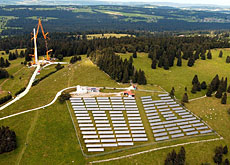Subsidies to put wind in Swiss sails

Parliament is banking on a new reimbursement scheme for renewable energies to bring wind power production up to European levels.
A price guarantee to cover costs, scheduled for 2008, is expected to encourage producers of wind energy to expand.
It is an area in which Switzerland is lagging behind European Union nations.
Reimbursement programmes have put wind energy on a fast track across Europe, with Germany and France even exporting their technology worldwide.
But in Switzerland wind turbines supply electricity for a mere 4,000 households.
The remunerations to be paid by power companies are supposed to foster high tech innovations in the area of wind-generated electricity.
At present the development and set-up costs are not reimbursed, so companies are skittish about investing.
The Swiss government hopes that the lure of subsidies from next year will help wind energy become more competitive, even if it remains a niche product.
According to Michael Kaufmann, head of SwissEnergy, a government programme to promote energy efficiency and renewable sources of energy, the reimbursement plan has already starting bearing fruit.
“We are receiving phone calls from interested parties every day,” Kaufmann says. “And not only from farmers interested in small wind turbines, but also from banks and larger companies that want to invest in renewable energies”.
Suisse Eole, the association to promote wind energy, also reports growing interest. “Our association is getting lots more calls, ” says Robert Norbaty, Suisse Eole’s director.
Low cost
“Wind energy, along with hydropower, is a very low cost renewable energy, with wind power producing the least emissions of all renewable energies.” Suisse Eole advises and supports interested parties on issues such as location, permits and planning.
Both Kaufmann and Norbaty believe that Switzerland has the potential to generate more wind energy – even though the country, lacking a coast, is not an obvious location for it.
They see wind energy use expanding in the mid- to long-term to a maximum of 1.5 to two percent of total Swiss electricity output.
A study completed in April estimates that the number of wind turbines at the largest wind power plant in Switzerland, on Mont Crosin in the western Jura hills, could conceivably double from the eight it has at present.
Advocates see Switzerland’s abundance of hydropower, coupled with its edge in innovative technologies, as working in favour of the expansion of wind power.
Water and wind
Hydroelectric plants, they say, mean Switzerland’s plentiful dams and reservoirs could be mobilized to pick up the slack when the wind fails to blow.
And Switzerland’s countless innovative firms and institutes would be capable of developing the high technology tools required to make wind energy more viable.
Even so, there are qualms about the planned expansion of wind energy. A leading environmental group, the Swiss Foundation for Landscape Protection, is concerned about turbines marring the countryside and decimating the bird population.
But Horbaty believes it is absolutely essential for Switzerland to develop wind energy. “It’s a symbol of the link between high technology and climate issues,” he maintains. Similarly, Kaufmann thinks wind power is a trump in terms of energy, economics and technology.
Both see the prospective reimbursements as providing the impetus for specialised small and mid-sized enterprises to innovate.
“It’s a great opportunity, and if Switzerland grabs it, it will be economically successful”, says Kaufmann.
swissinfo, Renat Künzi
Currently, Swiss wind parks generate about 14 gigawatt hours (GWh) of electricity a year.
The government has set as its goal an increase of electricity produced by renewable sources to 500 GWh by 2010, equal to 1% of Swiss electricity use in the year 2001
50 to 100 GWh should come from wind turbines.
Locations have been designated for 28 large wind parks and 68 smaller facilities.
European Union countries have used reimbursement mechanisms to turn their wind power industry into a worldwide leader.
In Switzerland a similar scheme promoting renewable energies is due to come into force in 2008.
The operators of small wind parks placed at upper elevations will receive more subsidies to cover their higher costs than those with turbines close to urban centres.
As power companies will pass the reimbursement costs on to consumers, the effort to promote renewable energies will ultimately be paid for by consumers.

In compliance with the JTI standards
More: SWI swissinfo.ch certified by the Journalism Trust Initiative











You can find an overview of ongoing debates with our journalists here . Please join us!
If you want to start a conversation about a topic raised in this article or want to report factual errors, email us at english@swissinfo.ch.